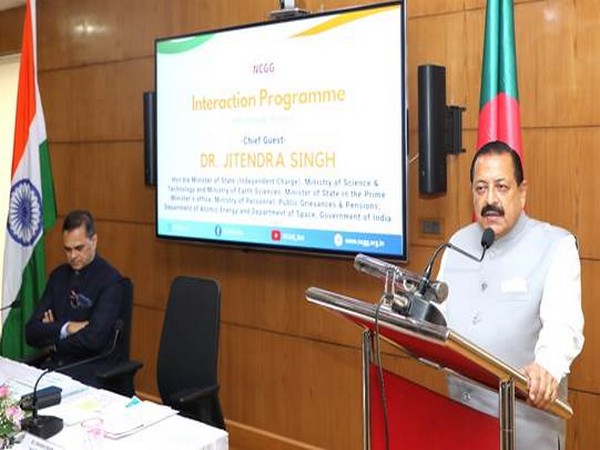Common issues, challenges can be addressed through mutual exchange of best practices, knowledge, says Union Minister Jitendra Singh
Common issues and challenges can be addressed through mutual exchange of best practices and knowledge, says Union Minister Dr. Jitendra Singh while interacting with 16 Deputy Commissioners from Bangladesh attending 'Special Capacity Building Prog. on Public Policy and Governance by the National Centre of Good Governance at CSOI, New Delhi.

- Country:
- India
Common issues and challenges can be addressed through mutual exchange of best practices and knowledge, said Union Minister Jitendra Singh while interacting with 16 Deputy Commissioners from Bangladesh attending 'Special Capacity Building Prog. on Public Policy and Governance by the National Centre of Good Governance at CSOI, New Delhi. Singh added that India's developmental programmes, such as PM Awas Yojana, Ayushman Bharat, CPGRAMS, and Swamitva, are being replicated in Bangladesh and acting as role models.
Addressing the gathering, the minister said, "India and Bangladesh share a profound historical bond, encompassing cultural, linguistic, and civilizational ties. It is heartening to see here bright senior civil servants of Bangladesh attending the capacity-building programme being conducted by the NCGG." He underscored that India has consistently upheld a relationship of mutual trust, equality, and understanding with Bangladesh. He also recalled that even before India's independence, Bengal had contributed the best of civil servants.
He highlighted that India and Bangladesh, being part of the same subcontinent, face similar challenges in terms of geography, resources, climate, and culture. The Union Minister highlighted the reforms undertaken in the past decade and assured that they would continue to usher in citizen-centricity and good governance.
The Minister expressed satisfaction that our success stories in geo-spatial policy, land record management and mapping, and door-to-door delivery of services are being revered by Bangladesh. He also highlighted that the PM Awas Yojana is being replicated as the Ashrayaan Project, and similarly, PM awards for excellence in public administration are also being replicated. The Ayushman Bharat Scheme is a path-breaking initiative providing cashless treatment and ensuring healthcare for all.
Singh emphasised the fact that it is the world's first health insurance scheme that covers pre-existing medical conditions, and citizens can get treated on the very next day of being insured. He also recalled the massive infrastructure boom and mentioned the projects, which are in line with a long list of rail connectivity projects, for which both sides signed a new memorandum of understanding (MOU) extending transit facilities for the movement of Bangladeshi goods to Nepal and Bhutan through the Indian railway network.
On tackling a similar set of challenges and increasing collaboration, Singh directed to 'Identify Twin Districts--one from India and Bangladesh--that have an identical set of problems, such as disease governance issues or topographical challenges, and cooperate and exchange best practices. The Minister highlighted that the DBT model and JAM trinity saved millions of people from starvation and reduced leakages and pilferages in the long run.
"Prime Minister Narendra Modi's 'Neighbourhood First policy' has strengthened Indo-Bangladesh Ties through Capacity Building, Joint cooperation on infrastructure development, and increased people-to-people connections," he said. He also emphasized on aligning national visions and collaborate with the respective broader visions of 'Viksit Bharat 2047'and 'Smart Bangladesh Vision 2041.'
The Deputy Commissioners from various districts of Bangladesh thanked India for organising this programme and recalled that India was the first country to recognise Bangladesh as a nation and establish diplomatic relations. The National Centre for Good Governance organised a one-week-long capacity-building programme for Deputy Commissioners on the request of Bangladesh, which has shown keen interest in India's development journey and, more specifically, the schemes and reforms brought in the last decade. Till now, 2270 civil servants in Bangladesh have been trained by the NCGG. V. Srinivas, Secretary, DARPG, DG, NCGG; and Shri Amitabh Ranjan, Registrar, IIPA, were also present on the occasion. (ANI)
(This story has not been edited by Devdiscourse staff and is auto-generated from a syndicated feed.)
ALSO READ
Odisha Embarks on Ayushman Bharat Digital Mission
Unfortunate that 'Aapda govt' in Delhi not implementing Centre's Ayushman Bharat Yojana: PM Modi.
Uttar Pradesh Leads in Ayushman Bharat Registrations
NHRC Probes Ayushman Bharat Denial After Tragic Suicide
Odisha Embraces Ayushman Bharat: A Health Revolution










